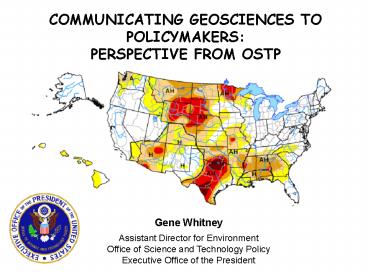Gene Whitney - PowerPoint PPT Presentation
Title:
Gene Whitney
Description:
Put yourself in their shoes; what else are they worried about? SUMMARY ... Reliable, timely information is the currency of DC. ... – PowerPoint PPT presentation
Number of Views:68
Avg rating:3.0/5.0
Title: Gene Whitney
1
COMMUNICATING GEOSCIENCES TO POLICYMAKERS PERSPEC
TIVE FROM OSTP
Gene Whitney Assistant Director for Environment
Office of Science and Technology
Policy Executive Office of the President
2
OFFICE OF SCIENCE TECHNOLOGY POLICY EXECUTIVE
OFFICE OF THE PRESIDENT Dr. John H. Marburger
III, Director and Presidents Science
Advisor 50 staff 20 Ph.D. scientists
- OSTP dual roles
- Reactive Ensure that President and
Administration officials are fully informed about
current scientific and technical issues (many!) - 2. Pro-active Develop interagency strategies
to implement Presidents science and technology
priorities.
3
NATIONAL SCIENCE AND TECHNOLOGY
COUNCIL Committees, Subcommittees and Working
Groups
Science
Env. Nat. Res.
Technology
Nat. Home Sec.
Research Business Models
Global Change Research
National Security RD
Technology Dev.
Education Workforce Dev.
Radiological/Nuclear Countermeasures
Air Quality Research
Networking Information Technology
Large Scale Science
Disaster Reduction
International
Nanoscale Science, Eng. Technology
Aquaculture
Ecosystems
WMD Medical Countermeasures
Human Subjects Research
Toxics Risks
Aerospace
Water Availability Quality
IWG Physics of the Universe
Standards
US Group on Earth Observations
Biotechnology
IWG Plant Genome
Infrastructure
IWG Dom. Animal Genomics
Future of Land Imaging
Oceans
Key Earth science components
4
- Some Earth Science Issues of National and Global
Concern - Climate change
- mechanisms (e.g., paleoclimate)
- impacts (e.g., disasters)
- mitigation (e.g., carbon sequestration)
- Water availability and quality
- Energy supply / materials supply
- Nuclear waste disposal - Yucca Mountain
- Earth observations monitoring
- Natural hazards and disasters
- Coastal and ocean processes and management
- Earth science from space and planetary science
- Etc.
5
HOW BRAINS WORK
Scientist brain Data ? Interpretation ?
Hypothesis ? Test . ? Position Politicia
n brain Position ? Search for support ?
Data
6
How decisions are made
Laws Regulations
Economics
Morals Ethics
DECISION or POLICY
International Politics
Domestic Politics
Science Technology
7
How do policy makers become informed about
scientific issues? 1. Individual study 2.
Staff work 3. Expert briefings or
testimony 4. Dialog with or tutorials from
scientists
Involvement of scientists or societies
8
Why are you communicating with policy makers or
decision makers? To inform a policy or
decision To persuade? Who should do it?
9
- FIVE SKILLS A SCIENTIST NEEDS TO INFORM POLICY
- Ability to communicate technical issues in
layman's terms. - Ability to communicate the uncertainty inherent
in scientific information without sending the
message that there is no right answer. - Ability to effectively communicate possible
consequences or outcomes of decisions using
scenarios. - Ability to understand how scientific information
might be used (or misused) by proponents of
either side of an issue. - Ability to actively participate in a highly
confrontational or contentious policy debate
without losing sight of the objective scientific
evidence.
10
- TEN STEPS FOR SCIENTISTS TO AFFECT POLICY
- Identify the real decision makers not always
obvious. - Identify other scientific participants know
what they are thinking. - Anticipate dont wait for panic mode early
information is the best information, but provide
it when they need it. - Face-to-face is better than paper or e-mail (
more difficult). - Establish technical credibility stay in your
lane. - Establish political credibility know the
context of the issue. - Offer to help be a resource. Follow up.
- Understand the calendar for budgets and
legislation. - Learn the rules of institutions yours and
theirs.
11
- Some intangibles in the process
- (just suggestions, not rules)
- Try to get to know decision makers and their
staff before you make a request. - Have a specific goal or specific request
policymakers are busy and dont want to chat or
deal with long laundry lists. - Make short presentations (30 minutes) and leave
concise materials (1-pagers). - Understand the authority and limitations of a
policymakers role in addressing your science
issues. - Put yourself in their shoes what else are they
worried about?
12
- SUMMARY
- Key federal policymakers include Congress and
staff, Administration officials and staff, agency
officials and staff. - Policymakers need scientists to inform rational
policy development. - Scientists need policymakers to implement a
scientific vision or to support institutions. - Reliable, timely information is the currency of
DC. - We must work together to achieve goals that are
in the best interest of the Nation.































